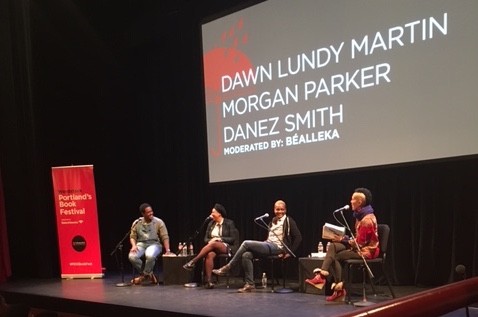
At this year's festival, some of Wordstock's bugs still seemed yet to be squashed: I've argued in the past that a crowded book festival is a good problem to have, but increasingly it just seems like a problem at Wordstock. This year's bookfair was largely un-navigable due to crowding. I'm not sure what would ameliorate this short of reinstating the festival's second day and splitting up high-draw events between the two of them, giving attendees more time and space to explore, rather than crushing a tremendous amount of programming into a single day.
Another quibble: As I walked between reading locations on SW Park and stood in line at the event's food carts (there were more this year; thank god!), I also found myself wishing this was a summertime festival. Waiting in line is a pain, but it's way better on days when you want to be outside. A damp early November day is not one of them.
Lest you think I had a terrible time, almost all of the panels I attended were totally delightful in that "I really loved English seminars in college" way. My favorite hands-down was The Body and Power: New Black Poetry, with poets Dawn Lundy Martin, Morgan Parker, and Danez Smith, with excellent, thoughtful moderation from cultural consultant and public educator Béalleka. Some moderators—some I saw at Wordstock included—phone it in, asking softies and wasting time telling weird inside jokes.
But Béalleka asked smart questions that weren't easy to answer, and the resultant conversation—at times challenging, always warm and smart as hell—was a joy to witness. I already love Parker's poetry—go read There Are More Beautiful Things Than Beyoncé if you haven't already—but I was equally impressed with off-the-cuff musings on race, poetry, trauma, and bodies from Martin and Smith.
Smith read from their poem “summer, somewhere," imagining an afterlife for young Black men murdered by police. With lines like "don't call/us dead, call us alive someplace better," it was a vital, beautiful poem that made me want to seek out more of Smith's work. Parker took the often too-academic language around the body to task, saying, "Oh, the body... It's so abstract. The body is a person. Shit is abstract and it need not be because there's a person inside the body."
"Poems are some of the freest spaces," said Smith. "This may be the realest body I have."
Another argument for the body, from Martin: "We often experience the world as objects and not people."
You can probably get a sense of how heady this conversation was. Some conversations make you feel like your brain is expanding just by hearing them. This one—so challenging and complex, with an undertone of defiant joy—was one of those, right down to Parker's insistence that audience questions "better have a question mark at the end," a preference I wish more authors would insist upon at often-onerous audience Q&As.
Equally vital were Ellen Ullman's observations on being a woman in the early years of the tech industry, in a conversation with fellow author Doree Shafrir moderated by the New York Times' (previously the Hairpin's) Jazmine Hughes. Ullman had choice words for everything from the insufferable James Damore ("I could talk for hours and he doesn't deserve hours"), to claims that Google and Facebook will temper inappropriate political content ("Wanting a computer to have more intelligence in this mass situation... it's beyond what a human curator can do."), to advice for women in sexist industries ("Refuse to be sent away").
Oh my god, Ellen Ullman, can you make an app of yourself saying these things?
These panels made my day at Wordstock well worth braving the crowds. But next year, it'd be cool if I could also walk through the bookfair.














